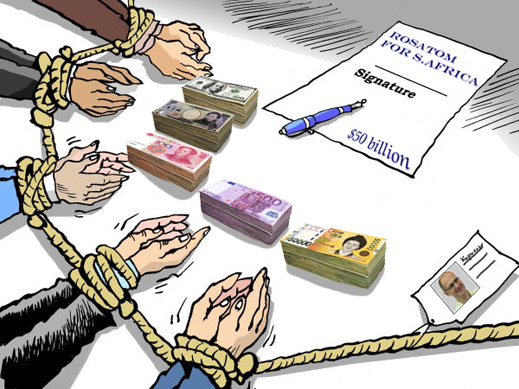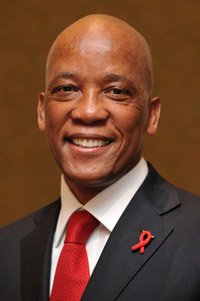
By John Helmer, Moscow
In the world of mules there are no rules (so Ogden Nash wrote last century). In selling $50 billion worth of nuclear reactors, there are a few.
Sergei Kirienko, the prime minister in charge of the Russian government’s default on its treasury bonds and other financial destruction in 1998, is no donkey. But this week, as the head of the state nuclear power monopoly Rosatom, it’s far from clear what rules Kirienko, and his South African counterparts, had in mind when they initialled their agreement on cooperation this week in Johannesburg.
Russian and South African press reports, as well as officials of both countries, have described the document as an agreement between the two governments for “strategic partnership and cooperation in the field of nuclear energy and industry”, as Vedomosti called it.
The special nuclear energy correspondent for Itar-Tass, Elizaveta Tsaritsyna, quoted the South African energy minister, Ben Martins, as saying that “all legal procedures under Rosatom’s agreement with South Africa on cooperation in nuclear energy will be completed by February 15 next year. The agreement ‘is initaled at the technical level and it is now necessary to complete the legal process. We will do this by completing all the necessary approvals at the beginning of next year. We have set ourselves the goal of signing by February 15.’ The SA government ministries which should approve the wording of the inter-government treaty include Energy, Finance, and Industry.
A press release issued on Tuesday by Rosatom subsidiaries, the wittily named NUKEM Technologies and its parent NIAEP-ASE, makes the agreement look less than it is, calling it a “Memorandum of Understanding” with the Nuclear Energy Corporation of South Africa (NECSA) . “The companies”, claims NUKEM, not the governments, “have “agreed to develop strategic cooperation in engineering, design, procurement and construction of complex capital projects and facilities.”
 In his remarks before the signing, Kirienko who had earlier hosted Minister Martins (right) in Moscow and on a tour of reactors in Rostov, explained that Rosatom wants to build eight nuclear reactors of the VVER type for South Africa, with total capacity of 9.6 gigawatts. Kirienko has estimated the cost of a single reactor at $5 billion. Buying the full brace of eight would cost between $40 billion and $50 billion, Rosatom briefing papers claim. South African estimates are in the same range. Kirienko has offered Russian bank financing for the deal, and promised that at least a third of the contract price will be invested by Rosatom in local sub-contracting and job creation.
In his remarks before the signing, Kirienko who had earlier hosted Minister Martins (right) in Moscow and on a tour of reactors in Rostov, explained that Rosatom wants to build eight nuclear reactors of the VVER type for South Africa, with total capacity of 9.6 gigawatts. Kirienko has estimated the cost of a single reactor at $5 billion. Buying the full brace of eight would cost between $40 billion and $50 billion, Rosatom briefing papers claim. South African estimates are in the same range. Kirienko has offered Russian bank financing for the deal, and promised that at least a third of the contract price will be invested by Rosatom in local sub-contracting and job creation.
There is nothing exceptional in the Russian bidding for this, one of the largest nuclear reactor contracts in the offing in the world. Competing against Rosatom and lobbying their company interests are the US, France, China, Japan and South Korea, in partnership with local companies. The competition is particularly intense for the decision to build the first two reactors as that may lock in a national technology making inevitable later reactor purchases from the same source. So far nine different reactor technologies have been offer to the South Africans from several different countries. The lobbying against Russia has been ferocious, and during the term of former South African President Thabo Mbeki, there were bitter recriminations in Moscow at the South African tactics. For that story, read this.
Jacob Zuma, who succeeded to the presidency in Pretoria in September 2008, appears to be more obliging than Mbeki; but he has yet to deliver more than undertakings in principle and agreements on intention. In parallel, Zuma is reported to be behind another large Russian transaction, a $320 million sale and purchase of the Russian-owned South African steel company, Highveld Steel & Vanadium. That deal was announced by the Russian steel group Evraz in March. But the deal closure has been repeatedly postponed. The buyer, a nonentity, I mean entity, called Nemascore, created weeks before the purchase agreement, is connected to Zuma. So far it has been unable to secure South African government guarantees for the loan financing to pay Evraz.
In Moscow this week Evraz spokesmen refused to say what is the status of the sale to Nemascore. That story can be read in more detail here.
David Gleason, the leading investigative journalist in South Africa, has reported: “I remain convinced the purchase of Highveld is part of a much bigger arrangement which I am sure will extend to the BRICS’ Development Bank and through it to which specialist is selected to supply the next nuclear power station. The Russians, already building nuclear plants in Turkey, would love to give Areva and Westinghouse the finger in Africa, and South Africa’s a good place to start. There’s a you-scratch-my-back, I’ll-scratch-yours somewhere in this.”
Between 2006 and 2008, when Eskom, the SA power utility, confirmed it had sent requests for bid estimates to Westinghouse (US) and Areva (France), but not to Rosatom, the French attempted to bypass competitive tendering for the deal. Their tactic was to fix an inter-government agreement formalizing Areva as the preferred bidder. Then President Nicolas Sarkozy lobbied Mbeki for his agreement, but failed as Mbeki fell from power. Francois Hollande, Sarkozy’s successor, is still trying for the same preferment in Pretoria. He visited last month, and Zuma will be in Paris in December. So far the French have announced deals to supply thermal and solar energy plants and refit South Africa’s railways.

The Russian and South African governments have already signed more than one inter-government agreement for nuclear energy. There was one in November 2004 which, according to Rosatom, includes “design, construction, maintenance and modernization of nuclear power and research reactors; the use of nuclear energy for electricity, heating, desalination of salt water and Nuclear Research; exploration and development of uranium deposits; production of fuel for nuclear power and research reactors , including the development of the fuel and the design, construction , operation, technology and modernization of installations for the production of fuel.”
Enriched uranium to power the single commercial reactor South Africa already has at Koeberg has been supplied by Rosatom’s fuel subsidiary, Tenex, for many years. The reactor itself was built in the 1980s by Areva, still one of the competitors for the new reactor contract.
The Russian uranium enrichment arrangement for Koeberg was renewed in August 2010. Then in June 2012 a memorandum of understanding was signed between Rosatom and NECSA for “elaboration of joint business projects in areas such as production and marketing of isotope production , manufacture of nuclear fuel, as well as the production of energy equipment.” A month later Rosatom opened a representative and marketing office in Johannesburg.
At the end of March 2013 at the BRICS summit in Durban, and then again at a May meeting in Sochi, Zuma and President Vladimir Putin reiterated their interest in striking a deal on the nuclear reactors. The point was emphasized when their foreign ministers met in St. Petersburg in July.
In an advance leak of the inter-governmental agreement, Carol Paton of Business Day of Johannesburg reported a version of the pact was being circulated in September. “Its drafting follows a visit to Russia by Minister of International Relations and Co-operation Maite Nkoane-Mashabane last month…Department of Energy officials stressed that the draft seen by Business Day is not a final document.”
According to Paton, the Russia-South Africa paper aimed to put Rosatom in pole position to supply the nuclear reactors. “Adviser to the minister of energy Robert Nkuna said that documents of this sort go through many iterations before they are finalised. Several other agreements were also in the process of being negotiated including one with the French government, which is expected to be signed this week during the visit of French president Francois Hollande. The Russian agreement is a revision of an earlier agreement signed in 2004.”
“In many aspects the draft agreement is similar to other government-to-government agreements, which commit the parties to working together in the interest of promoting nuclear energy for peaceful purposes. It is however, more detailed than other such agreements and includes in its scope co-operation in the ‘design, construction, operation and decommissioning of nuclear plants’. At face value, it also appears to undermine other bilateral agreements in so far as it commits South Africa to secure agreement from Russia should it want to enter into any other agreements with third-country organisations. Among the obligations of the parties listed is ‘mutual consent’ over the involvement of a third country.”
Rosatom was asked to provide a copy of the agreement initialled this week in Johannesburg. It declined. Rosatom does say it has built nuclear reactors in several countries on the basis of inter-government treaty; these include Turkey, Bangladesh and Belarus.
According to the Paton report, the rivals and opponents of Rosatom are coming out of the woodwork. They charge the reactor deal should be based on a competitive bidding process, not on an inter-government pact. Paton quoted Eskom as claiming the government has yet to decide “how the procurement will be done and who will manage the process”.
In Moscow Rosatom was asked to clarify whether the agreement text contains a proviso allowing for the award of the reactor construction contracts without competitive tendering or bidding. Spokesman Andrei Ivanov replied: “there is still no agreement yet. It will be concluded by 15 February. It is impossible to comment on the details of what doesn’t exist yet. If you talk about the tender for the construction of nuclear power plants in South Africa, this is not a question for us, but for the government of South Africa. At the same time I draw your attention [to the fact] that nuclear power plants in world are built through two procedures: tenders and intergovernmental agreements. These are two different options. The choice is always by the party who is the customer.”
A bulletin issued by the South African Broadcasting Corporation on Monday was either confused on what is happening inside the government, or revealed that not even Energy Minister Martins is sure he knows. The SABC claims “the government is expected to open the bidding process for a tender to build a new nuclear power station by the middle of February next year. Russia’s state owned nuclear energy company, Rosatom, is currently in meetings with local nuclear industry players in Johannesburg to study cooperation possibilities. Energy Minister Ben Martins, who’s been on a study tour of Russia’s nuclear facilities, says this doesn’t mean Russia will get the contract.”











Leave a Reply